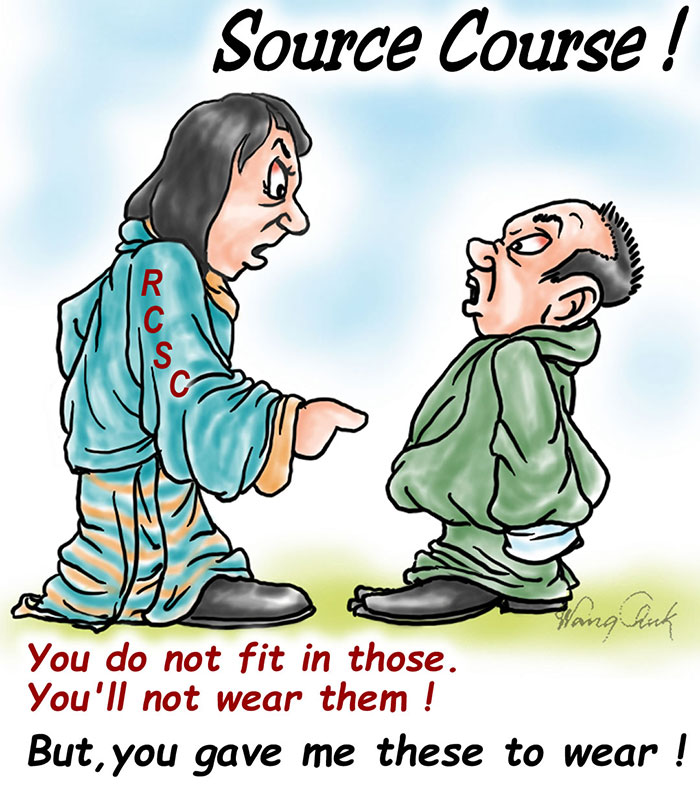 |
| Press release from the RCSC: Click LINK |
If today’s press release by the Royal Civil Service Commission (RCSC) is credible, it appears that the RCSC has awakened from its long-term hypersomnia.
If the RCSC practically manage out the 50% of the executives who failed to meet the expectations as conveyed in the report, it will be the beginning to end its laissez-faire attitude for leadership assessment they had thus far.
If the RCSC roll out a similar leadership evaluation drill in other segments of the civil service as declared in the statement, they have eventually realised their mandate in fulling the vision of ensuring Excellence in Service.
If the RCSC introduce this leadership appraisal right from their organisation and first, hold those RCSC members accountable for promoting those underachieving 50% of executives (because it is the RCSC who is responsible for the selection and promotion of the executives), then they will have read between the lines of His Majesty the King’s 114th National Day address.
We have heard a plethora of stories about leadership crises happening in the left, right, and centre of civil service.
We have witnessed the saga of management failures practically at every level.
We have experienced a lack of transparency due to authoritative leadership.
We have a history of leadership malfunctions that have ironically resulted in the dismissal of subordinates in some situations.
We have evident examples of employees who have been denied career privileges because of selfish and opportunistic leaders.
We have read stories of civil servants pouring frustrations, expressing a lack of faith in the system, and their active disengagement all due to autocratic leadership.
We have foolishly sympathised with decent and honest people who lost their jobs while serving the nation under the tyrant leadership.
We have consciously appreciated corrupt leaders in our organisation because the fate of our future lies in their signature.
We have publicly sung a song of praises to those crooked leaders because it has become the accepted DNA of our culture if we wish to climb up the career pyramid and succeed in our professional life.
We have leaders who are habituated running upstairs and running down people.
The list goes on. We don’t require hiring any foreign expats (as we often do) to examine this phenomenon. Neither do we need any subtitles to understand this catastrophe.
But what we need to understand is that, for a small Kingdom like ours where civil servants account for 4.05 percent of the total population, i.e a ratio of 1:25 (refer December 31, 2019, page 3) that derives their monthly salary from the government coffer, this is costly. There is no room for complacency because we are playing in the stadium of the national coffer.
However, post press release by the RCSC, some individuals opined that every one of us owes those executives gratitude for their long years of service. Long years of service? OK. But what virtue is it to preserve the broken roof if it does not function in protecting the house that contains valuable assets?
I propose these perspectives with no malicious intent. But during the past 12 years of my service under numerous bosses, I have experienced this never-ending pandemic of leadership crisis in different working environments. The eyes awashed with tears always see things better.
If the RCSC genuinely plan to reshape and revolutionise the structure of the civil service, we must first prune out the failing leaders instead of looking for ways to discipline subordinates. When the system is led by talented and perceptive leaders, change will be easy and obvious. A good leader should be a good follower first.
This recent leadership assessment exercise by the RCSC, nonetheless, is welcoming and greatly needed, if not long overdue. This indicates that the RCSC has diagnosed itself as the prime player in cultivating this sickness and that now they are looking for a remedy to contain it before it is delayed. This clearly demonstrates that the RCSC recognised the flaws in their recruiting process that culminated in the selection of unsuitable candidates, necessitating the search for a newer and transparent approach to selecting the right candidates.
However, if they fail to execute their own press release, it will also imply that they are a commission established to blame others for their own failures. As vouchsafed in this report, we anxiously anticipate the RCSC managing out those failed executives transparently and immediately.
 |
| The image that speaks volumes: Courtest Click LINK |
For now, the faculty of every Bhutanese sight and hearing are fixated on the RCSC to tune the frequency of their words into action. But none of us would buy this claim unless they demonstrate it in practice.
We will witness again to gauge how competent they are in mitigating the mess of these leadership crises which they have created. Lest we forget, how we watched their bold action in removing 500 positions in the civil service – positions that afforded a modest living for many low-income families; positions that they once established and dismantled altogether.











